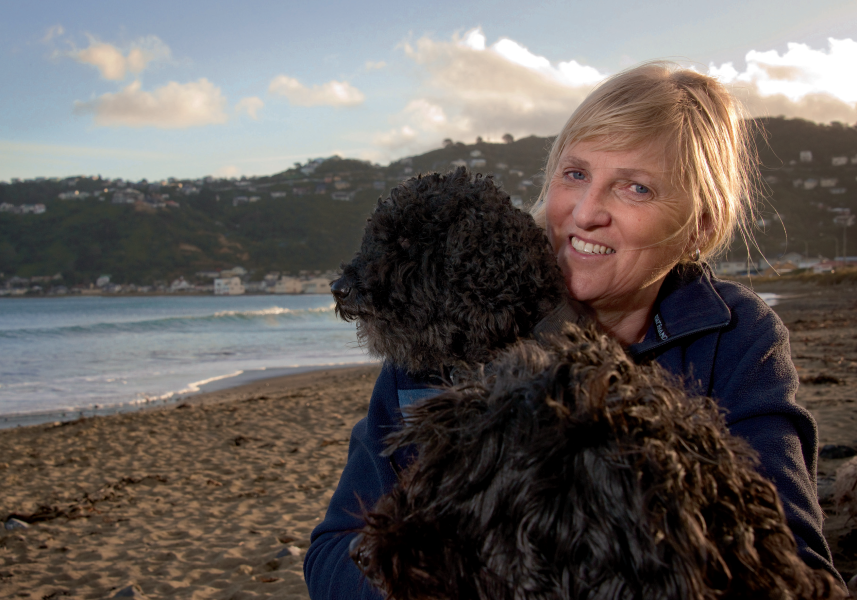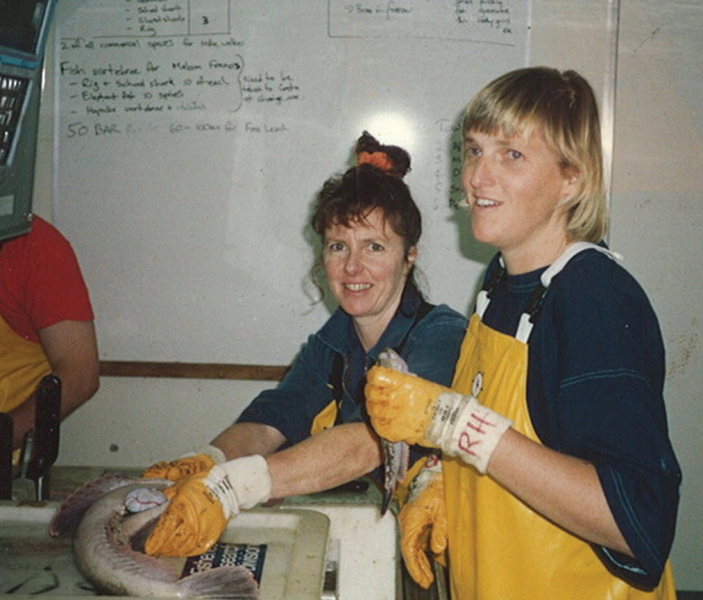Watching TV as a kid was time well spent for Rosemary Hurst, she tells Dave Hansford.
It was probably inevitable. As a kid, in her native England, Rosemary Hurst was fascinated by anything nature had to offer. Her idea of a birthday treat was a visit to the Science and Natural History museums in London.
Even then, the sea had a particularly strong pull. Trips to her grandparents' place by the sea near Southampton, were like going home. "I was always really fascinated by nature programmes on TV," she recalls. "Especially the underwater ones." Rosie tuned in to the pioneers of scuba – Hans and Lotte Hass, Jacques Cousteau.
Six weeks at sea, then, aboard the liner that carried her to New Zealand, aged nine, weren't just exhilarating: they were decisive. Today, Rosie is NIWA's Chief Scientist, Fisheries; a specialist in middle depth and inshore fisheries, resource surveys and stock assessment, climate effects on fisheries, and fish communities.
She gained a zoology degree from Wellington's Victoria University – eventually. "My original PhD was on terrestrial ecology, but it didn't work, so I switched back to marine." She never regretted it.
If the passenger liner had been a revelation, research vessels were the start of something even bigger. "I was very keen to work in that space." Even if her studies hadn't worked out, she says, "I knew I'd end up working in the marine environment somehow – I would've trained as a ship's officer or something like that."
There was no need: she started work at the then Ministry of Agriculture and Fisheries in 1979. In 1995, she joined the nascent NIWA, and was made a regional manager in 2000.
Come leisure time, you might expect Rosie to head inland for a change of scenery, but no: she and husband John jump aboard the yacht he built 20 years ago, and head for Abel Tasman. Their two daughters are now in their early twenties, but, she says: "They still love it."
Rosie loves getting out with her dogs on Wellington's walkways. She's also a keen photographer, and when she's not capturing her daughter's hockey games on pixels, she's down at the sea again: "I enjoy landscape and wildlife photography – in New Zealand, that's pretty much about birds. But I also like to photograph anything to do with the sea: anything to do with nature, really."
But while she's in her element beside – or on – the sea, an ear injury as a child means she can't dive under it. "I certainly enjoy snorkelling, though."
Like any scientist, she likes to ponder the big questions. "For me, that's about the idea of sustainability: making sure that whatever we do in the sea is sustainable in the long term. Not just around fisheries – if New Zealand is going to get into marine mining, or even in terms of climate change – ensuring any impacts are well managed is of great concern."
She's not about to run out of work – or wonder – anytime soon. "There are a lot of things we still don't really understand," she says. "How the various components of our marine ecosystems interact, and how resilient – or how vulnerable – they are to change and disturbance. These are complex issues that we need to be able to understand better in order to be able to provide advice to managers."
She marvels at the digital technology that allows her daughters "to satisfy their curiosity, in ways we never could. They simply type in a search field, and up comes the answer: it's amazing. When you think about how it was for us; we had to go down to the library. There wasn't a lot of instant gratification."
Modern technology has also shown her much more of the hidden side of the sea she loves. "The capability we have now, to be able to go down to quite extraordinary depths, and see what's down there, is fantastic. Up until 15 years ago, we were really just scratching the surface. But now we can collect samples from depths of thousands of metres, deploy underwater cameras and acoustic equipment and get a much better view of what's down there.
Rosie's own relationship with the ocean is based on love and respect, but she's not sure that humans on the whole "have conducted ourselves honourably in our relationship with nature. I think we can be proud that, in New Zealand, we've taken some important steps to manage our fisheries sustainably. It makes you feel more comfortable, living in a country where sustainability is high on the agenda." However, she adds, "That's not to say that we couldn't do more."
There's still work to do, she points out, on issues "like fishing impacts on other parts of the ecosystem. Consumers are now more aware of the broader issues, with the advent of certification standards. Sustainability of the environment is becoming more important – not just sustainability of the fisheries."
So what's a fisheries scientist's favourite dinner?
"Hapuku," offers Rosie, without pause for thought. "It has a nice flavour, and beautiful texture."
Any cooking tips?
"Pan fry it very lightly, so that it's just cooked." You read it here first...
End


